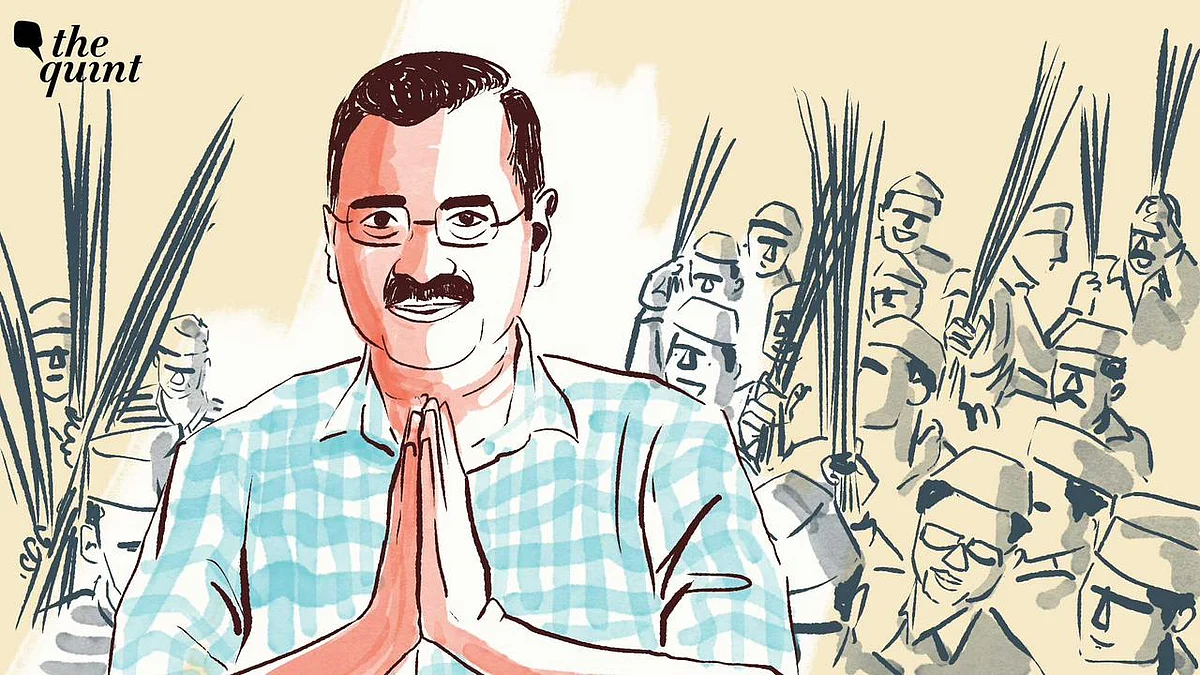
Back to Ramlila Maidan, Arvind Kejriwal's Anti-Ordinance Pitch Is Linked to 2024
On Sunday, AAP returned to Ramlila Maidan for a political rally first time since the 2012 anti-corruption movement.

advertisement
On a scorching Sunday afternoon thousands of people turned up at the Ramlila Maidan in Delhi for a 'mega' rally organised by the Aam Aadmi Party (AAP) against an Ordinance brought in by the central government which grants control over aspects of Delhi's governance to the Lieutenant Governor (LG), appointed by the Centre.
The Ordinance, brought in on 19 May, designated the LG as the administrator of Delhi, who will have the final say on the postings and transfer of all bureaucrats serving in the Delhi government.
This came only a week after the Supreme Court held that the legislature or the elected government of Delhi has control over bureaucrats in administration of services.
"Modi is saying that he does not believe or follow the orders of the Supreme Court. For the first time in 75 years since our Independence, we have a Prime Minister who says that he is not going to listen to the orders of the Supreme Court," Kejriwal said at the rally.
Arvind Kejriwal at the AAP 'mega' rally organised at Delhi's Ramlila Maidan on Sunday, 11 June
(Photo: PTI)
Sunday's venue was interesting, the speeches were fiery, and the turnout was massive. Also, full marks to the party for reaching out to Opposition leaders to keep the issue burning before they finally take it to Supreme Court after the summer vacation.
The journey forward, however, is not expected to be easy.
Here, in this article, The Quint analyses the hits, the misses, the way forward for AAP as it takes on the Centre in Delhi, and the road to 2024.
Back to Basics
Sunday was the first time since the India Against Corruption (IAC) movement — largely credited for the birth of AAP — that Kejriwal returned to the Ramlila Maidan for a political rally.
Kiran Bedi, Anna Hazare, Arvind Kejriwal, and Manish Sisodia (left to right) at a rally during the anti-corruption movement.
(File photo)
It was hence only fit for the party to return to Ramlila Ground as it faces one of the most difficult times in its decade long run in Indian politics.
“We have gathered over here to defeat a dictator. Just like how that fight 12 years ago was successful, I am confident that this fight that we are starting from this holy ground of the Ramlila Maidan will also be successful and the dictatorship that we are experiencing in this country will come to an end,” Kejriwal said while addressing the rally.
Imprisonment of top AAP leaders (Manish Sisodia, Satyendra Jain), regular questioning by the investigative agencies, and a full-fledged battle with the Centre over governance of Delhi are among the major concerns of the party as it heads to the 2024 Lok Sabha elections with a 'national party' status.
The Delhi Dilemma
The fight between the Centre and Delhi's legislature over who gets to govern how much of the national capital precedes the AAP government. Leaders from all parties including the BJP and the Congress have at one point or the other put forward a demand for complete statehood for Delhi.
In fact, Delhi's statehood was on BJP's manifesto as it went to polls in the 2014 Lok Sabha elections. Former Chief Minister and Congress leader Sheila Dixit also raised the demand for statehood at several occasions.
In such a scenario, it becomes crucial for the AAP to do something which the previous governments didn't do to win this battle — mobilise the people of Delhi in support of the cause, put the demand on the ballot box, and inform people about how the tussle between the Centre and the state is hampering everyday administration in Delhi.
The rally on Sunday at Ramlila Maidan saw participation of thousands of people.
(Photo: PTI)
"We understand that support of the people is supreme. Hence, we've tasked workers and officials at micro level including the councillors to take the message to the people of Delhi and explain to them how this ordinance is set to impact their lives in a simpler and more tangible language," the party member said.
Road to 2024
On 11 April, the Election Commission of India (ECI) gave a 'national party' status to AAP. This was after its performance in Delhi, Punjab, Goa, and Gujarat elections.
Since then, however, there's been little to celebrate for the party as Manish Sisodia was jailed, Kejriwal was called in for questioning by the Enforcement Directorate (ED), and a security crisis came to fore in Punjab vis-a-vis the Amritpal Singh case.
Amid this, the big dilemma that haunts the top leadership is to choose between strengthening the organisation in multiple states including those gearing up for Assembly polls (Rajasthan, Madhya Pradesh) or setting the Delhi house in order.
Former Delhi Health Minister Satyendra Jain was arrested in connection with a money laundering case.
(Photo: PTI)
Delhi's Deputy Chief Minister Manish Sisodia was arrested in connection with the liquor policy scam.
(Photo: PTI)
Amid this, as Kejriwal continues to meet leaders of regional parties and seek their support in fight against the ordinance, several in the party believe it is a way to stitch the Opposition together and project Kejriwal as one of the key forces against Narendra Modi in the run up to the 2024 Lok Sabha elections.
- Access to all paywalled content on site
- Ad-free experience across The Quint
- Early previews of our Special Projects
Published: undefined